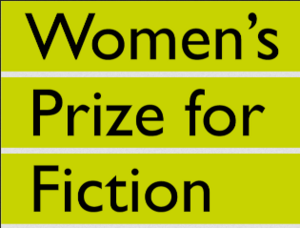Women's Prize for Fiction facts for kids
Quick facts for kids Women's Prize for Fiction |
|
|---|---|
 |
|
| Presented by | Women's Prize for Fiction |
| Location | United Kingdom |
| First awarded | 1996 |
The Women's Prize for Fiction is one of the most important book awards in the United Kingdom. It's given every year to a female author for the best full-length novel written in English. The author can be from any country, but her book must have been published in the UK during the past year.
The prize has had different names over the years, including the Orange Prize for Fiction and the Baileys Women's Prize for Fiction, because of its sponsors. In 2023, a new award called the Women's Prize for Non-Fiction was started for non-fiction books.
Contents
Why Was the Prize Created?
The prize was started in 1996 to celebrate the amazing books written by women. The idea came after the famous Booker Prize award in 1991. That year, all six books on the final list were written by men, even though about 60% of the novels published were by women.
A group of people in the book industry, including authors, publishers, and librarians, felt this was unfair. They did some research and found that women's writing was often overlooked by major book awards. So, they created the Women's Prize for Fiction to make sure female authors got the recognition they deserved.
How the Prize Works
The winner of the prize gets £30,000. She also receives a bronze statue called the Bessie, which was made by the artist Grizel Niven.
Each year, a long list of nominated books is announced in March. This is narrowed down to a shorter list in June. A few days later, the winner is chosen by a team of five leading women.
History of the Prize's Name
The prize has changed its name several times, usually because of the company sponsoring it.
- Orange Prize for Fiction (1996–2006 and 2009–2012)
- Orange Broadband Prize for Fiction (2007–2008)
- Baileys Women's Prize for Fiction (2014–2017)
- Women's Prize for Fiction (2013 and 2018–present)
The first sponsor was a phone company called Orange. After Orange stopped its sponsorship in 2012, the prize was supported by private donors in 2013, including Cherie Blair.
From 2014 to 2017, the brand Baileys sponsored the prize. Since 2018, the award has been supported by a "family of sponsors," which includes Baileys and Audible.
Recent Winners
The winner of the 2024 Women's Prize for Fiction was V. V. Ganeshananthan for her novel, Brotherless Night.
#ThisBook Campaign
In 2014, the prize launched a campaign called #ThisBook. The goal was to find out which books by women have had the biggest impact on readers. Nineteen famous women helped start the campaign. Thousands of people shared their favorite books on Twitter.
The top 20 books were announced on July 29, 2014. It was interesting to see that almost half of the winning books were written before 1960.
- To Kill a Mockingbird (1960), Harper Lee
- The Handmaid's Tale (1985), Margaret Atwood
- Jane Eyre (1847), Charlotte Brontë
- Harry Potter (1997), J. K. Rowling
- Wuthering Heights (1847), Emily Brontë
- Pride and Prejudice (1813), Jane Austen
- Rebecca (1938), Daphne du Maurier
- Little Women (1868–69), Louisa May Alcott
- The Secret History (1992), Donna Tartt
- I Capture the Castle (1948), Dodie Smith
- The Bell Jar (1963), Sylvia Plath
- Beloved (1987), Toni Morrison
- Gone With The Wind (1936), Margaret Mitchell
- We Need to Talk About Kevin (2003), Lionel Shriver
- The Time Traveler's Wife (2003), Audrey Niffenegger
- Middlemarch (1871–72), George Eliot
- I Know Why the Caged Bird Sings (1969), Maya Angelou
- The Golden Notebook (1962), Doris Lessing
- The Color Purple (1982), Alice Walker
- The Women's Room (1977), Marilyn French
Reclaim Her Name Project
To celebrate the prize's 25th anniversary, the sponsor Baileys started a project called "Reclaim Her Name." In the past, some female authors used male pen names so that more people would read their books.
This project republished 25 of these books with the authors' real names on the cover for the first time. The goal was to give these women the credit they deserve. For example, the famous novel Middlemarch was republished under the author's real name, Mary Ann Evans, instead of her pen name, George Eliot. Another book, Indiana, was published under Amantine Aurore Dupin instead of her pen name, George Sand.
The project wanted to honor these authors by using the names they were born with. However, some people pointed out that many of these authors chose their pen names for important personal and professional reasons.
See also
 In Spanish: Premio de Ficción Femenina para niños
In Spanish: Premio de Ficción Femenina para niños
- List of literary awards honoring women
 | Jackie Robinson |
 | Jack Johnson |
 | Althea Gibson |
 | Arthur Ashe |
 | Muhammad Ali |

